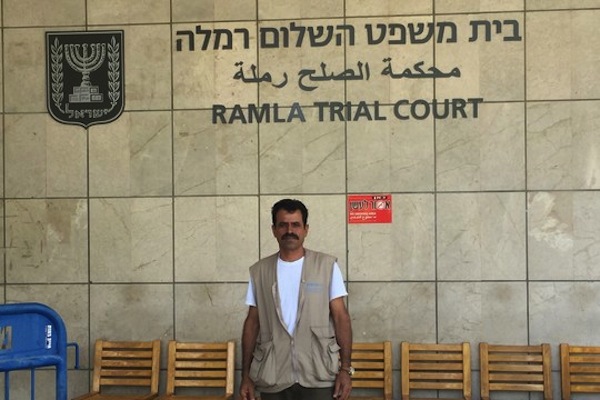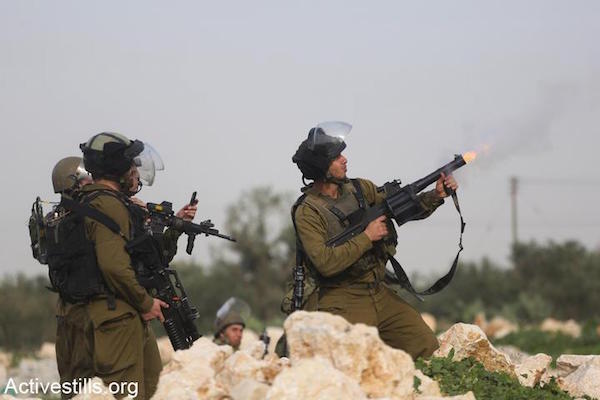This is the story of a Palestinian father whose son was shot in the back by two Israeli soldiers. In the bizarre reality of occupation, he is the one who must ask permission from the wardens while his son’s killers walk free.

What took place at the Ramle Magistrate’s Court on Thursday morning was beyond bizarre. Every encounter between a grieving family and those who killed their child is, without a doubt, terrible — but they usually look different than what I witnessed. Most of these meetings take place in district courts. Usually the ones who killed the child are brought to court house from prison, led by guards, while the family walks free. Not today. Not in this story.
In this story Ahmed Awad, whose 16-year-old son Samir was shot in the back and killed by two soldiers after he was already wounded, was the one who had to wake up early in the village of Budrus, obtain a special entry permit ahead of time to leave the West Bank and show up in a court where the prosecutor is not the same prosecutor from the previous hearing (perhaps the case is not important enough). The prosecutor did not utter a word to Awad. No condolences, no update — nothing.
At the end of the five-minute hearing Awad was resigned to request — with the help of an Israeli friend, since the court does not provide a translator for the victim of the crime — that the court allow him to be present at the next hearing. Then he had to go to the court clerk in have the judge’s decision written out as a court order, which he will need in order to obtain an entry permit at an Israeli army base in the settlement of Beit El. That hearing certainly won’t have a translator either, the prosecutor won’t say a word to him, because what difference does it make that Ahmed’s son, Samir, died after being shot in the back by the soldiers he is prosecuting?
Then there were the two now-discharged soldiers who aren’t sitting in prison, nor do they need special jump through bureaucratic hurdles and obtain special permits just to make it to the courthouse. They are not even accused of manslaughter, only reckless and negligent use of a firearm. The soldiers’ names cannot be published, despite the fact that they have been published in the past, since that is what their attorney requested in the previous hearing. The judge slapped a gag order on their names, saying that the court would look into whether they were previously published, and whether there is a danger that they will be published in the future. But on Thursday morning the judge extended the gag order, without looking into whether their names were published or whether they are actually in any danger. Just like that.

The soldiers have attorneys, former military prosecutors. In a previous hearing one of the attorneys argued the indictment was “unusual” because the crime took place in the framework of an “operational incident that lasted 38 seconds.” That’s it. An operational incident of 38 seconds, and the life of a 16-year-old who would have been 19 today. We count the soldiers’ precious time spent in court, but no one is counting the family’s mourning and longing, the life of Samir Awad, stolen in just 38 seconds. After all, this was merely a matter of recklessness, not shooting a wounded teenager in the back as he was running away. So why should it matter that today he could have been a university student?
The hearing was short. Extremely short. The accused deny the charges, but want time to negotiate with the accuser (the state). Perhaps even mediation. The prosecutor agrees, the judge agrees; no one says it out loud, but the atmosphere feels like we are heading toward a plea bargain. Another hearing is scheduled in another two month. The court allows Ahmed Awad to be present in the next hearing as well. Order, after all, is of utmost importance. Next case.
The soldiers and the attorneys leave. The judge and the prosecutor continue on to the next case. Ahmed Awad stands smoking outside the courthouse with two Israeli friends. He does not know what comes next or where to pour all of his pain over Samir, a child who walked through a hole in the separation fence near his school and was caught by two soldiers. He was wounded but managed to flee, running back in the direction of his home when they shot him in the back. Two soldiers whose names are not allowed to be published fired eight bullets, one of them piercing the nape of his neck and killed him. No one says a word about this in court. The next hearing is in two months. Once again Ahmed will wake up early to pass through the checkpoint. Maybe he will discover that a plea bargain has been signed and see the two people who killed his son put this whole affair behind them and move on with their lives.
All that took just 20 minutes in a Ramle courtroom on a Thursday morning.
This article was first published in Hebrew. Read it here.


